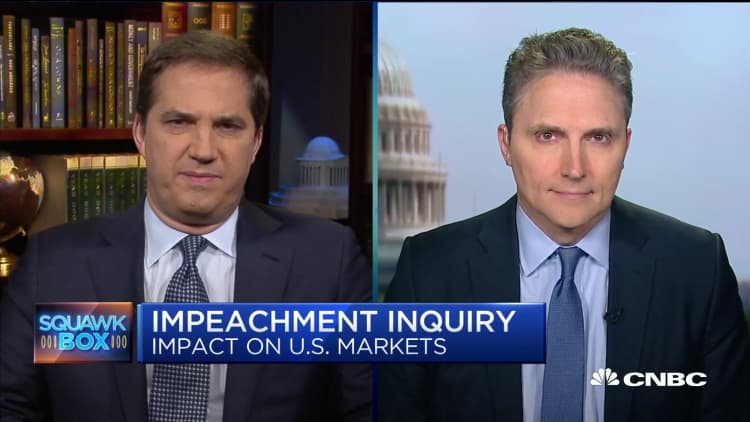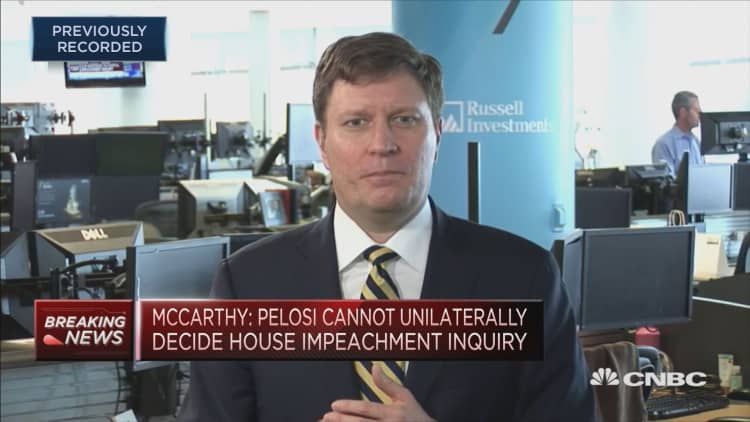
Investors shouldn't worry about what a formal impeachment inquiry into President Donald Trump could mean for his current term or even his reelection chances, Wall Street investment banks advised clients.
But what they really should be worried about, Washington policy analysts said, is what the impeachment inquiry means for a potential trade deal with China and an already agreed-upon deal with Canada and Mexico. Investors also can forget about any new legislation like a drug prescription policy, they said.
Several brokerages rushed to assure clients on Tuesday and Wednesday that while it's unlikely the Republican Senate will ever convict the president, House Speaker Nancy Pelosi's decision to move forward with the impeachment inquiry could mire several of Trump's key trade initiatives, including the passage of the USMCA and talks with Beijing.
Pelosi announced a formal impeachment inquiry on Tuesday as a growing number of Democrats concerned over the president's alleged abuses of power overwhelmed her initial reluctance. The most recent Democratic outcry comes amid accusations that the president tried to coerce Ukraine's president to investigate the family of former Vice President Joe Biden.
Trump released on Wednesday notes of his call with Ukrainian President Volodymyr Zelensky and stocks showed little reaction.
USMCA: 'Legislating is dead'
The investigation endangers the ratification of the landmark United States-Mexico-Canada Agreement — the rehashed trade agreement between the U.S., Mexico and Canada.
"Legislating is dead. As we previously said, impeachment will lead to Congress doing nothing except that which it must do by established deadlines (like funding the government)," wrote Raymond James policy analysts Ed Mills and Chris Meekins.
"The idea of bipartisan action on drug pricing, infrastructure, and potentially the passage of the USMCA (the new NAFTA) are dead until after the 2020 election," Mills and Meekins continued.
The U.S. sent about $300 billion in goods to Canada last year, more than to any other country, and about $265 billion in products to Mexico, its second-largest market. But the impeachment inquiry, at the very least, complicates that timeline, according to Dan Clifton of Strategas Research Partners.
"In the short run, it means it's unlikely that NAFTA's going to get through," Clifton said Wednesday on CNBC, referring to the USMCA. "If you remember last week, Nancy Pelosi went on Jim Cramer's show, saying that she wanted to get the 'yes' on NAFTA. That's probably going to move away."
The legislation, shortened to USMCA and pitched as a replacement to NAFTA, is one of the administration's major economic achievements. The accord makes changes to the trade relationships between the U.S. and its two largest trading partners, including stricter rules on the country of origin for auto parts and better enforcement of wage rules.
One of Trump's top trade advisors, Peter Navarro, told CNBC earlier this month that the deal is so important that he was 100% sure Congress would ratify it this year. That seemed even more likely as recently as last week, when Pelosi told CNBC's Cramer that Democrats "hope that we're on a path to yes" on approving the USMCA.
Sino showdown
Wall Street also turned its attention to the odds of a U.S.-China trade deal in light of the new impeachment debate.
The entrenched trade war between the Washington and Beijing remains one of the market's major headwinds both due to the imposition of tariffs on billions of dollars worth of each other's goods as well as the uncertainty felt by CEOs trying to protect supply chains and other infrastructure.
Despite persistent calls from Wall Street to settle for partial concessions, the White House has toed the line on demands for a comprehensive agreement, complete with remedies for alleged intellectual property theft.
"From a China trade perspective, the debate will be about a Trump pivot towards a win via a 'mini deal' or doubling down to cater to his base," Raymond James' Meekins and Mills wrote.
"Trump doubled down in his criticism of China in his speech before the UN ... and did not sound like someone on the verge of a 'mini deal,'" they added. "However, the path forward remains very uncertain. We have repeatedly seen President Trump turn towards positive developments in trade disputes at times of political and stock market uncertainty."
Though the two nations appeared to be close to a deal in the spring, negotiations broke down after China reneged on certain promises, according to U.S. trade officials. As the dispute intensified, the U.S. placed Chinese telecommunications giant Huawei on a blacklist that barred the company from purchasing parts from American suppliers.
Trump on Wednesday said the U.S. and Japan had reached a limited trade deal as they push for a broader agreement. The first stage of the deal will open markets up to $7 billion in U.S. products, the president said while meeting with Japanese Prime Minister Shinzo Abe at the U.N. in New York.
Retaliatory responses by China against U.S. farmers sent American soybean exports to China tumbling, with total shipments to the Asian economic giant expected to end this marketing year some two-thirds lower, according to industry experts.
"On the one hand, the inquiry could fortify President Trump's trade stance as he tends to retrench and redirect when attacked. On the other hand, the inquiry could cause the president to look for victories beyond the water's edge to bolster his case for reelection," wrote Compass Point analyst Isaac Boltansky.
"We continue to believe that a de facto detente will materialize by the end of the year as we view the December tranche of tariffs on Chinese consumer goods as a motivator."
Gutsy gambit?
But in terms of how the impeachment inquiry will affect Trump's tenure in the White House, or even of reelection, remains a matter of debate.
Some, including Strategas' Clifton and Keefe, Bruyette & Woods Washington researcher Brian Gardner, argue that opening an impeachment query poses a significant risk not to Trump, but to Democrats up for election in 2020.

When "the Republicans chose to impeach Bill Clinton, they were headed for a 40-seat win in that midterm election and the Democrats ended up winning five seats," Clifton recalled. "So impeachment actually hurt the Republicans 20 years ago and that's the risk the Democrats are taking by entering this fight."
Gardner noted Trump's uncanny ability to leverage political drama and said the recent news likely hurts Biden's odds of securing the Democratic presidential nomination.
"Mr. Trump has a unique ability to manipulate these kinds of situations to his advantage and if the House moves to impeach him we think it could backfire on Democrats and help Mr. Trump's reelection prospects. Democrats could easily overplay their hand and create a backlash that will unite Republicans," Gardner wrote.
Correction: A summary misstated the day of Pelosi's announcement. It was Tuesday.
— With reporting by CNBC's Michael Bloom.


